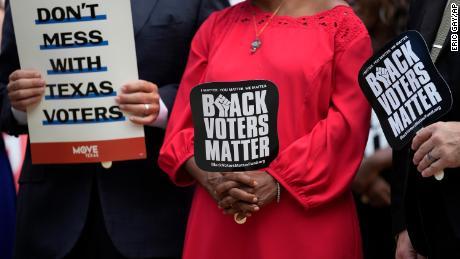(CNN)Texas lawmakers gave final approval Tuesday to a bill that would impose new restrictions on voting, sending it to the desk of Republican Gov. Greg Abbott -- who said in a statement he will sign it into law.
Abbott's signature would add Texas -- where Republicans are seeking to hold onto power in one of the nation's fastest-growing and diversifying places -- to a list of states that includes Florida and Georgia attempting to seize on former President Donald Trump's lies about election fraud and enact restrictive laws this year.
Democrats had fled from the state for weeks to prevent the House from having the quorum necessary to vote on the bill -- forcing Abbott to call the Legislature into two special sessions to address what the second-term Republican misleadingly characterized as "election integrity," even though there was no evidence of widespread voter fraud in Texas.
The latest
- Texas House approves GOP voting restrictions bill after months of Democratic delays
- What's in the restrictive voting bills being pushed by Texas GOP lawmakers?
- Fact check: Here are 20 things Texas Republicans' elections bill would do
- Eighteen states have enacted new laws that make it harder to vote. Texas is one of them.
The bill "will solidify trust and confidence in the outcome of our elections by making it easier to vote and harder to cheat," Abbott said in a statement Tuesday after the bill's final passage in the state House and Senate. "I look forward to signing Senate Bill 1 into law, ensuring election integrity in Texas."
Once several Democrats returned to the Capitol in Austin last week, the party was powerless to stop election law changes that its leaders say will impose burdens that fall disproportionately on minorities and people with disabilities.
"I was born in segregation," Democratic state Rep. Garnet Coleman said before Tuesday's House before the vote. "We think we've made progress, and then all of a sudden there's a new law that moves us back in time."
Senate Bill 1 takes aim at Harris County, the home of Houston, which last year offered drive-thru voting and 24-hour early voting. The bill restricts the hours counties can offer early voting to between 6 a.m. and 10 p.m. And it prohibits tactics like the ones Harris County used in 2020, when a garage at the Toyota Center -- the home of the Houston Rockets -- was used as a place residents could vote from their vehicles.
The bill also blocks counties from sending unsolicited mail-in voting applications -- even to those who are over age 65 and therefore qualify automatically to vote by mail. It also places new rules around mail-in voting, increases protections for partisan poll watchers and sets new limits on those who help voters, including those with disabilities, to cast their ballots.
The House's passage of SB 1 last week was the final major hurdle Republicans needed to clear. Then, the House and Senate hashed out the differences between the versions of the bill they'd approved in a conference committee, requiring both chambers to sign off on the final language.
Republicans on the conference committee chose to remove a bipartisan amendment that would have prevented voter fraud charges against people who did not know their "particular circumstances" made them ineligible to vote.
The amendment, which was adopted in the House without any debate, was created in response to the case of Crystal Mason, a Texas woman sentenced to five years in prison for voting while on supervised release from prison, even though she said she did not know she was ineligible to vote and the provisional ballot she cast never counted.
The House passed the final bill Tuesday on an 80-41 vote, and hours later the Senate approved the bill with an 18-13 vote.
"The right to vote is too precious, it costs too much, for us to leave it unprotected, unsecured," said state Sen. Bryan Hughes, the Republican author of the measure. "This is a bill we can be proud of. It's going to help every voter."
Democrats in Texas -- as the party's members have in other states -- said the only way to halt Republican laws that restrict voting access is for Congress to pass federal voting rights protections, which remain stalled on Capitol Hill.
"We knew we wouldn't be able to hold off this day forever. Now that it has come, we need the U.S. Senate to act immediately to pass federal legislation to protect Texas voters from Republicans' assault on our democracy," Texas House Democratic caucus chair Chris Turner said in a statement.






